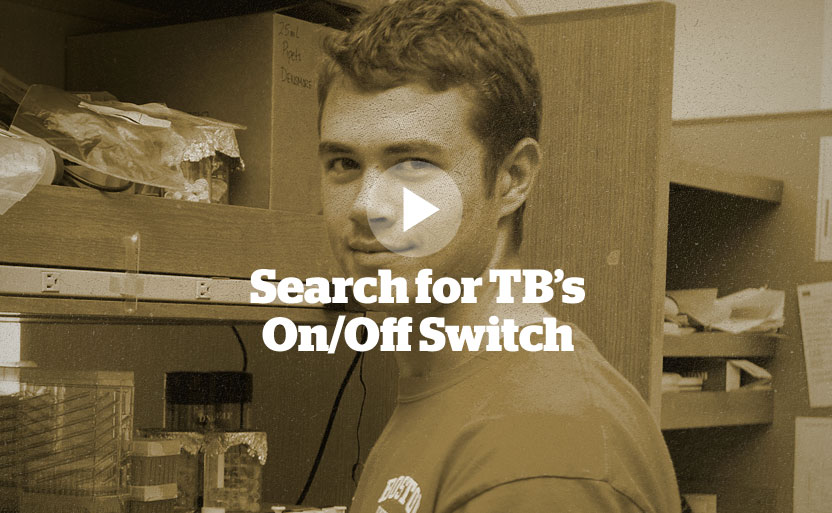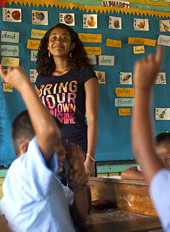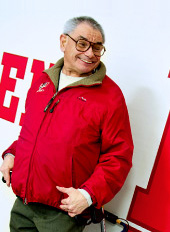What works in a lab doesn’t
always work in the field.
That’s lesson number one Amy Canham brought back from Zambia when she went to the African nation two years ago to figure out the best way to build a portable pulse oximeter, an instrument that measures oxygen in a person’s blood and can help doctors distinguish patients with malaria from those with pneumonia. It’s a lesson, Canham says, that should be required learning for anyone who hopes to design instruments that will be used in places where spare parts are truly spare—places like Zambia or Nicaragua, where she traveled last spring with a group of engineering students and professors.
“One thing we learned was that it’s impossible to find double A batteries in Zambia,” says Canham. “On the other hand, cell phone batteries are available everywhere, so if you’re going to design a medical device in a resource-limited place like Zambia, you want it to run on cell phone batteries.”
It’s also a lesson of increasing importance at the College of Engineering, where Dean Kenneth Lutchen has put forth an extraordinary proposition as a kind of moral lodestar for the college. Lutchen wants to create what he calls societal engineers, people who, in his words, “use the grounded and creative skills of an engineer to improve the quality of life for one person or for an entire population.”
One such person is Canham (ENG’11), who worked in Zambia with Muhammad Zaman, a College of Engineering assistant professor of biomedical engineering, and with BU’s Center for Global Health & Development. Canham, whose Zambia research included appraisals of software to speed the transmission of medical test results to and from rural clinics, paid for the African journey with money from a Kenneth R. Lutchen Distinguished Fellowship, one of 10 fellowships funded by annual donations of $100,000 from an anonymous alumnus.
Lutchen points to the fellowship, Canham’s project, and Zaman’s partnership with the Center for Global Health & Development as efforts that fit the portfolio of the societal engineer, an idea that came to him when he was appointed dean in 2006.
“I looked around and tried to conceptualize the goals of an undergraduate education in engineering,” he recalls. “What were we trying to achieve? How did an engineering education map into the greater context of society? I recognized that undergraduate education must prepare people for success, where success was an ambition to impact society. It dawned on me that we have the potential to transform the goals and experience of engineering education at the undergraduate level.”
Lutchen discussed his notion with his leadership advisory board, with faculty, and with others, all people he describes as leaders of society, whose success was built on an undergraduate education in engineering.
“What I heard from my West Coast advisory board and others time and time again was that it was a unique concept and a powerful one,” Lutchen says. “It became clear that this was not just a Lutchen thing, not just an idea that I liked, and that it went beyond the general inclination that we could be educating engineers more broadly.
“Another point that came up was a growing recognition by the faculty and the advisory board that we are producing a generation of students who are more service-oriented, who want to give back to society,” he says. “They want a purpose in life. It’s not just about financial success, although that is also important—it’s a powerful enabler. They want to know how their undergraduate experience will prepare them to have an impact on society.”
Today the College of Engineering, whose research funding has grown from $8.2 million in 1994 to nearly $80 million last year, has many projects and programs that fit the societal engineer mission. The new Technology Innovation Scholars program (TIS) sends engineering students out to elementary schools, middle schools, and high schools to demonstrate some of the ways engineering impacts society. The program, which pays a stipend and travel expenses to students, recently dispatched four BU students to Masconomet Regional High School, in Topsfield, Mass., where a game show and robot demonstration persuaded a good number of the 200 high school students in attendance that engineering is not just for nerds. Technology Innovation Scholars have also mentored students at the John D. O’Bryant School of Mathematics & Science, in Roxbury, Mass.
Lutchen is now designing a course that would take the TIS concept to a higher level (and reverse it) by bringing in working engineers to talk with undergrads about what engineers do. And he encourages students to take advantage of courses on technology entrepreneurship taught at the School of Management and courses in technology and public policy at the College of Arts & Sciences.
Lutchen, who reorganized the College of Engineering in 2008, sees the spirit of societal engineering in student-inspired efforts like the nonprofit Engineers Without Borders, whose BU student chapter was founded four years ago and has helped design a better water system for a village in rural Peru. He also cites the Sustainable Neighborhood Lab project, an interdisciplinary enterprise that includes ENG, CAS, and SMG and hopes to bring more efficient energy solutions to Boston’s Back Bay neighborhood. Lutchen would like to see more of that, and he is encouraging a more interdisciplinary approach to students’ senior design projects. He’s also guiding the construction of a new facility on the first floor of 44 Cummington St. that would serve as a tinker workshop, where students can create their own projects. The college is contemplating the idea of an annual prize for the best project to come out of this workshop, and when that comes to fruition, it’s a good bet that it will have a societal engineer bent to it.
He also sees it in the research projects of several professors. Irving Bigio, a professor of biomedical engineering and of electrical and computer engineering, is working on a screening tool for cervical and oral cancer that can be used in resource-limited settings. Selim Ünlü, a prolessor of electrical and computer engineering and of biomedical engineering, is developing a point-of-care diagnostic device for the dengue fever virus. Catherine Klapperich, an associate professor of biomedical engineering and of mechanical engineering, is developing a microfluidic “lab on a chip” that can identify pathogens quickly and can function in resource-deprived areas.
In May 2011, these 3 professors traveled to Nicaragua with 11 students whose senior design projects were related to their research. The students were tasked with imagining how well the technology they were designing would work in a typical Nicaraguan clinic. Could the staff learn to use it properly? If it broke, could someone on site do the repair?
“We are producing a generation of students who are service-oriented, who want to give back to society,”
says ENG Dean Ken Lutchen.
“What we saw in Nicaragua was that that wasn’t the case,”
says Alessandra Forcucci (ENG’11), who graduated in May
with a degree in biomedical engineering. “We’d go to clinics
and there would be a graveyard of equipment out back. We
came home knowing that when you build this kind of
equipment, you have to have a systems approach. You have
to know the capabilities of the people who will use it, and you
have to have a way to fix it if it breaks.”
In Nicaragua the group visited several rural clinics, as well as a health clinic at La Chureca, a shantytown of more than 1,000 people, most of them children, who live in the city dump of Managua. Klapperich, who helped organize the Nicaragua trip, says the Nicaraguan medical technicians had a lot to say about what kind of equipment would be most helpful and what kind would soon end up in that dump.
“Those people really clued us in on the kind of thing we should be innovating,” says Klapperich. “They are the real innovators, because they have to be.”
Klapperich says that as her dean designs a curriculum for societal engineers, she has seen a student-driven push toward the same goals, particularly as they concern global health.
“Especially in the last two or three years,” she says, “I hear students saying things like, ‘I’d like to
go global with this, I’d like to travel, I’d like to make things better for the world.’”
Two of the projects tested in theory in Nicaragua are based at the University’s Lab for Engineering Education & Development (LEED), which was founded last year by Zaman with funding from his 2010 Innovative Engineering Education Faculty Fellowship. Also a faculty member at the Center for Global Health & Development, Zaman has plenty of life-improving projects on his plate. He has teamed up with the United Nations Economic Commission for Africa to bring state-of-the-art biomedical engineering education to African nations. And with help from the Republic of Korea, he is heading Engineering Expertise to Improve Health Outcomes in Africa, an ambitious initiative that hopes to develop a medical device engineering design competition, start biomedical engineering departments at interested universities there, create a summer institute on biomedical engineering innovation for top-notch students taught by leading experts in the field, and offer ongoing short courses on medical device innovation and sustainability. Zaman and his partners recently began pilot programs in Zambia, Kenya, and South Africa.
“The idea is to create capacity for innovators,” says Zaman. “For people who are not just fixing equipment or addressing small-scale challenges, but who will come up with the next generation of drugs and technologies.”
Lutchen says he can imagine a day when the College of Engineering is widely known for efforts to produce societal engineers. “I would like to think that as time evolves, the rest of the nation will see the concept as a more focused way to articulate the potential of engineering education and what its mission could be,” he says. “Engineering must be about more than creating or refining technology. It’s a profession. It’s a way to make a living, but it’s not about money. It must be a vocation and an avocation. Societal engineers are perfectly positioned to make the kind of impact on our society that no other professionals can, and they have a passion to do so. They see their product not as an end in itself, but as a means to an end.” ■










 Twitter
Twitter Facebook
Facebook
Comments
On 28 October 2011 at 10:23 AM, Nat Ordway (ENG'87) wrote:
I read this article with a lot of interest. I have been following the concept of a societal engineer since Dean Lutchen coined the term. It really hit home with me because this is how I've lived my life. For the past 25 years, I've approached problems both professionally and outside of my vocation the same way. And along the way, I've had friends, family, and people in general ask me for help, advice, and/or insight on various problems because of my approach. On many occasions, people have asked how I was able to assist in these myriad of problems. I didn't know how to label it; I just knew that my degree in Biomedical Engineering from BU was the foundation for it. Thank you Dean Lutchen for coining the term, societal engineer. Keep up your efforts, but I would say you're not only producing them, you've been producing them and just didn't realize it.